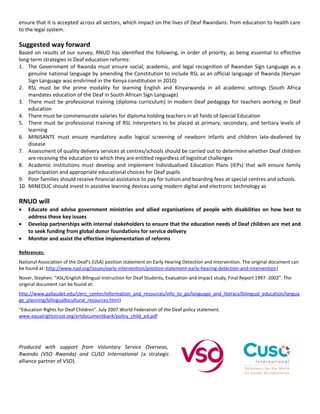Rnud deaf education position paper 2013
- 1. Position Paper on Deaf Education in Rwanda By the Rwanda National Union of the Deaf (RNUD) January 2013 Introduction The Rwanda National Union of the Deaf (RNUD) is a national non-governmental organization established in 1989 by Deaf people and is dedicated to advocating for equal opportunities for Deaf Rwandans and for their human rights as provided by international and national law. The current social, economic, and political situation for Deaf people in Rwanda is critical. Many live in extreme poverty due to lack of awareness of the needs of Deaf people in Rwandan society. Even today most Deaf children do not receive education, in violation of their rights as protected in the UN Convention on the Rights of Persons with Disabilities and UN Convention on the Rights of the Child. This is due to numerous reasons, including: ŌĆó lack of quality instruction from professionally trained teachers in special centers/inclusive schools ŌĆó lack of professionally trained Rwandan sign language interpreters in Inclusive Education programs ŌĆó lack of early childhood intervention with parents of Deaf infants and children. The denial of access to quality education also means many Deaf children are denied their mother tongue of Rwandan Sign Language (RSL) thus rendering them illiterate within their respective communities without any means of effective communication. Consequently, they live lives of marginalization and disenfranchisement and denied full and equal participation in all aspects of life, including human rights such as freedom of expression and access to information. Research is vital Currently there are no reliable statistics on the numbers of Deaf people in Rwanda and the needs and priorities of Deaf learners, their families and teachers are not well documented. Without accurate statistical data and without gathering the views of the Deaf community the needs of the Deaf community in Rwanda cannot be properly addressed ŌĆō this is also recognized by the Government of Rwanda in its draft Special Education Needs Strategy due for publication in 2013. Access to quality education is a human right and RNUD represents the concerns of its members in working to facilitate the reforms necessary for the realization of this right. Consequently, to fulfill its mandate in serving the Deaf communities of Rwanda and to provide assistance and guidance to relevant stakeholders in implementing needed reforms in Deaf education, RNUD has conducted a survey designed to assess the current operating conditions of special centres/schools attended by Deaf pupils. Analysis of data collected in 2012 from eleven special centres/schools across Rwanda has revealed a number of common needs and challenges, enumerated below. Our position RNUD believes a critical first step to facilitating literacy in reading and writing for Deaf Rwandans is for relevant stakeholders to recognize RSL as a genuine national language and ensure it is the chief modality of instruction in classrooms of Deaf children. This will require development of a curriculum for the training of teachers of the Deaf so that they can be recognized as professional instructors and paid commensurately. Legal recognition of RSL will also
- 2. ensure that it is accepted across all sectors, which impact on the lives of Deaf Rwandans: from education to health care to the legal system. Suggested way forward Based on results of our survey, RNUD has identified the following, in order of priority, as being essential to effective long-term strategies in Deaf education reforms: 1. The Government of Rwanda must ensure social, academic, and legal recognition of Rwandan Sign Language as a genuine national language by amending the Constitution to include RSL as an official language of Rwanda (Kenyan Sign Language was enshrined in the Kenya constitution in 2010) 2. RSL must be the prime modality for learning English and Kinyarwanda in all academic settings (South Africa mandates education of the Deaf in South African Sign Language) 3. There must be professional training (diploma curriculum) in modern Deaf pedagogy for teachers working in Deaf education 4. There must be commensurate salaries for diploma holding teachers in all fields of Special Education 5. There must be professional training of RSL Interpreters to be placed at primary, secondary, and tertiary levels of learning 6. MINISANTE must ensure mandatory audio logical screening of newborn infants and children late-deafened by disease 7. Assessment of quality delivery services at centres/schools should be carried out to determine whether Deaf children are receiving the education to which they are entitled regardless of logistical challenges 8. Academic institutions must develop and implement Individualized Education Plans (IEPs) that will ensure family participation and appropriate educational choices for Deaf pupils 9. Poor families should receive financial assistance to pay for tuition and boarding fees at special centres and schools. 10. MINEDUC should invest in assistive learning devices using modern digital and electronic technology as RNUD will ŌĆó Educate and advise government ministries and allied organisations of people with disabilities on how best to address these key issues ŌĆó Develop partnerships with internal stakeholders to ensure that the education needs of Deaf children are met and to seek funding from global donor foundations for service delivery ŌĆó Monitor and assist the effective implementation of reforms References: National Association of the DeafŌĆÖs (USA) position statement on Early Hearing Detection and Intervention. The original document can be found at: http://www.nad.org/issues/early-intervention/position-statement-early-hearing-detection-and-intervention) Nover, Stephen. ŌĆ£ASL/English Bilingual Instruction for Deaf Students, Evaluation and Impact study, Final Report 1997 -2002ŌĆØ. The original document can be found at: http://www.gallaudet.edu/clerc_center/information_and_resources/info_to_go/language_and_literacy/bilingual_education/langua ge_planning/bilingualbicultural_resources.html) ŌĆ£Education Rights for Deaf ChildrenŌĆØ. July 2007.World Federation of the Deaf policy statement. www.equalrightstrust.org/ertdocumentbank/policy_child_ed.pdf Produced with support from Voluntary Service Overseas, Rwanda (VSO Rwanda) and CUSO International (a strategic alliance partner of VSO).


